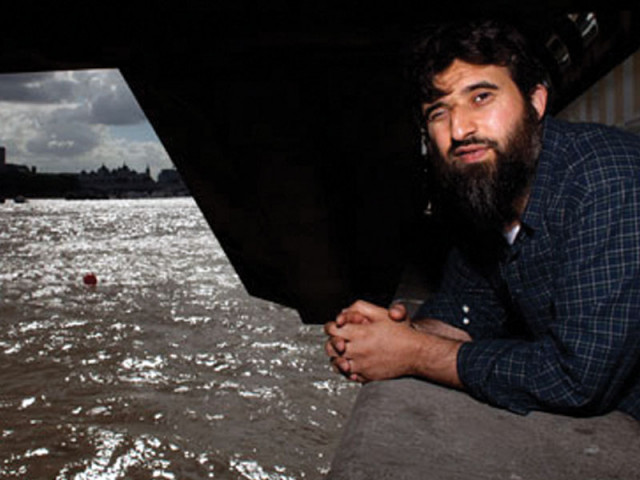Six years in hell
In Bagram, every time prisoners were caught speaking, they would be chained to the mesh in a stress position.

This is the story of Omar Deghayes, a British-Libyan who spent nearly six years at Guantanamo. He narrates the ordeals he faced from the time he was picked up from a rented villa near Liberty Market in Lahore to when he was finally set free.
Deghayes’ struggle against government authorities started long before he reached Guantanamo. He was a mere 10-year old boy living in Libya, when his uncle received a call from Muammar Qaddafi’s loyalists telling him to claim the dead body of his father, a solicitor who had been disliked by the regime. The family was put on the exit control list. If they had to leave Libya, even for medical purposes, one family member had to stay back as a ‘hostage’. When Deghayes was 17, his family managed to escape by forging travel papers and sought political asylum in Britain.
In the UK, the family settled in Saltdean. At college Deghayes studied Law and, while his family had also been highly secular, it was during his undergraduate years that his interest in the Islamic legal system and religion peaked. While still at college, he travelled to Bosnia for volunteer work and the experience had a profound effect on him. “It made me think of injustices, oppression, people being killed and human rights,” said Deghayes.
After finishing a Legal Practice Course in England, he took a break to visit friends in the Far East. He went first to Malaysia and then travelled across Pakistan. Once he reached Peshawar, he discovered that he could easily cross the border and go to Afghanistan. He had always been intrigued by the country and was curious to see how Shariah was being interpreted under Taliban rule.
“You cannot rely on UK or US-based media, especially when it comes to Islam. If something doesn’t suit their interest, they will brand it as extreme and fundamentalist,” he said. “I wanted to see for myself what was happening in Afghanistan.”
This was the decision which would eventually land him in Guantanamo.
In 1999 he crossed into Afghanistan. Once there, he married an Afghan woman and tried to set up a legal consulting office in Kabul. His wife gave birth to a baby boy on 24 September 2001, just 14 days after the event that would change his life forever.
Then came the US invasion, and he desperately tried to shift his family to a safer place.
“Our house was very close to the airport in Kabul,” he said. “and [US forces] planes were dropping bombs on civilians.”
They first shifted to Laghman, but when the bombings intensified, they left Afghanistan for Lahore. He was in Lahore four months, during which time he tried to find ways to get a passport made for his Afghan wife, who had never had any identification documents.
One day, nearly 50 armed men, with the slogan ‘NO FEAR’ emblazoned on their jackets, stormed into his villa, handcuffed him, and took him to a fortress-like prison in Islamabad. During this period of incarceration, he was taken to a house to meet officials from US and UK agencies before being transported back to prison. This happened numerous times.
“They’d ask questions like: Why were you in Afghanistan? Where were you in Afghanistan? Did you meet Osama bin Laden? Do you know anyone from alQaeda?” said Deghayes.
In Islamabad, he also met a woman, who seemed higher in rank than those who’d been previously interrogating him.
“This woman said something about the Taliban mistreating women and that Islam teaches its followers to mistreat women. I didn’t like that, so I answered back saying: ‘Islam doesn’t tell its followers to mistreat women. We protect them and look after them. And treat them as if they were very precious,’” said Degahyes.
After this it was decided that he would be dispatched to Bagram. The former detainee is of the opinion that the Americans had been paid to bring in any man of Arab descent in Pakistan, who had visited Afghanistan. A few days later, he was taken to the airport in Islamabad and handed over to the marines for transfer.
“It was not like the pictures you may have seen, which show a row of people tied down to the floor,” he said. “The way we were transferred, we were many, many people on top of each other like cargo and then chained to the floor and blindfolded.”
In Bagram, every time prisoners were caught speaking, they would be chained to the mesh in a stress position. Their head would be covered with a black hood. “There were times we would collapse from suffocation,” he recalls.
Day and night he was interrogated by British intelligence, FBI and CIA. “I was forced on my knees and beaten during those interrogations,” he said bitterly.
Frightened and unsure of what would happen to him, he would throw-up whatever he ate. He was transported to another prison camp, a long journey spent in hallucinations brought on by weakness and exhaustion.
“And then we were in Guantanamo,” he said with a sarcastic laugh.
Like everyone else in the prison, detainee 727 lived in solitary confinement, in a three by two metre cabin, for the first month. Because he would not take abuse without striking back, he endured the harshest treatment, spending most of his 5 years and 7 months at the camp locked up in isolation.
During interrogation, they would have him stand in stress positions for hours on end. These positions ranged from tying his hands to his feet so that they touched the floor, to a standing position in which they would tell him that there was live wires attached to hand, and if he moved he would get electrocuted.
“You would be hooded,” explained the former detainee, “so you wouldn’t know what was happening in the room.”
Whether it was Bagram or Guantanamo, the questions asked were the same:
“Why were you in Afghanistan? Where were you in Afghanistan? Did you meet Osama bin Laden? Do you know anyone from alQaeda?”
The abuse continued outside the interrogation rooms as well. Once, an officer crushed his finger in a door, and held on to it, hoping to make him scream. Deghayes suppressed his pain, unwilling to allow the officer the pleasure he would get from his screams of agony.
“I lost my finger — I have iron pieces in it and I can’t bend it properly.”
Another time, they broke his nose while raining kicks on his face with their boot-clad feet.
To set an example to the other prisoners for fighting back, the guards gouged not just Degahyes’ eyes with their bare fingers, but also those of every other prisoner in his block. He still can’t see clearly from the right eye. For six years, his cell was brightly lit day and night so that he wouldn’t be able to sleep. The airconditioners were on full blast, all the time.
“For many months I was locked up in what was essentially a freezer,” he said.
As if the physical abuse wasn’t bad enough, these guards played mind games to break the prisoners’ spirits. Deghayes longed to hear from his family, but didn’t receive a single letter for five years. When he finally started getting letters, the guards would censor vital parts, which would frustrate him. One letter read: “your son likes” and the rest of the sentence was blacked out.
But he suffered the most when the guards abused his religion.
“This was one thing that infuriated all the inmates,” said Deghayes. “They would take a copy of the Holy Quran, and throw it in a toilet, or on the floor. Sometimes you would come back to your cell and find boot stains or abusive words written inside the Quran.”
The abuse was regular throughout his time there; it didn’t ease up if the guards didn’t get any information from the detainee.
“The policy in Guantanamo was that they would agitate you every two months,” said the former detainee who now lives in London. “They want you to fight back. The interrogators said, ‘We will release you one day, but we will make sure that we have made you broken wretches, so that you won’t go back to jihad. And your family, your mothers and sisters, will be working just to keep you alive.’ So this was their intention.”
How were the prisoners able to keep their sanity intact? Many detainees suffered from mental health problems, but Deghayes kept himself sane by following a rigid routine. Though there wasn’t much physical activity possible in solitary confinement, he did push-ups every day. He dedicated his mornings to memorising the Quran, which he then revised in the afternoons.
The prisoners were able to communicate with others by shouting out loud, speaking into the air conditioning duct and talking into the sinkhole and then cupping an ear over it to hear the response. Deghayes spoke to prisoners from all walks of life and myriad nations. “There were teachers, linguists and journalists, there was a lot to learn from them,” he said.
After five years and seven months of detention without charge, Degahyes was finally released in December 2007. “The only thing these kind of prisons achieve is more hatred, turning more youngsters toward extremism,” he said, looking back at his experiences.
Published in The Express Tribune, Sunday Magazine. April 29th, 2012.



















COMMENTS
Comments are moderated and generally will be posted if they are on-topic and not abusive.
For more information, please see our Comments FAQ